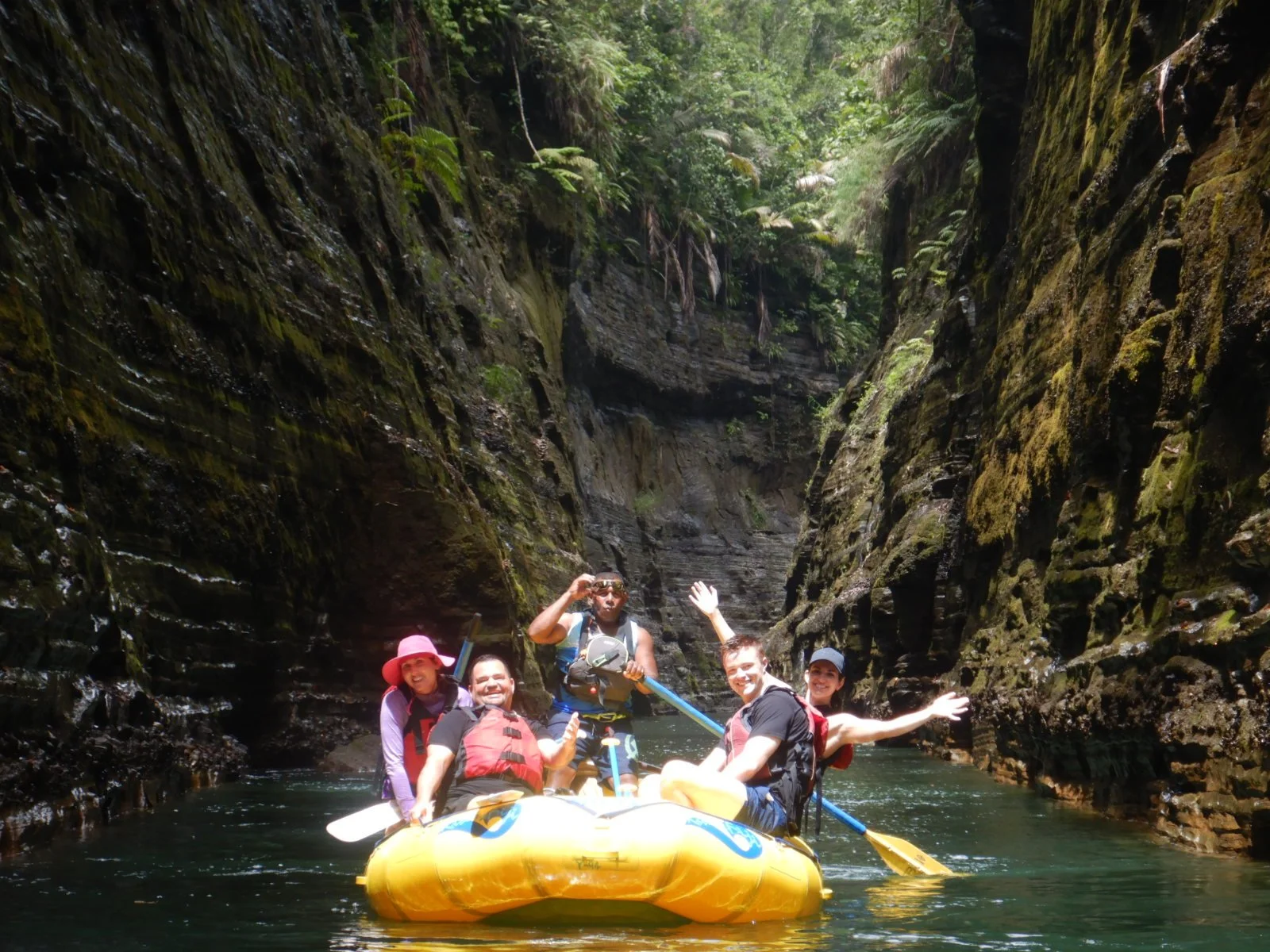Fiji is REAL, and Closer Than You Think
Fiji isn’t just a dream vacation destination—it’s a place where time seems to stretch, allowing you to savor life’s beauty without the rush. With over 300 islands, vibrant coral reefs, lush rain forests, and a culture steeped in tradition, Fiji offers everything a slow traveler could hope for. Whether you’re soaking in the warmth of the Fijian sun, exploring villages, or simply enjoying a good book under a palm tree, Fiji invites you to live on "Fiji Time." Here’s a deep dive into what makes Fiji an unparalleled destination for slow travelers.
White-water rafting between the canyons in Fiji is a Bucket List item.
The Magic of Fiji: More Than Just Beaches
Fiji’s natural beauty is undeniable, with white sandy beaches and turquoise lagoons that could rival any tropical destination. But what truly sets Fiji apart is its spirit. The moment you step off the plane, you’re greeted with a resounding “Bula!”—a word that means more than just hello. It embodies the Fijian way of life: warm, welcoming, and full of joy.
Beyond the beaches, Fiji’s islands offer a rich variety of experiences. Viti Levu and Vanua Levu, the two largest islands, are hubs for exploring the country’s culture and history. Remote islands like the Yasawas and Mamanucas provide serene, off-the-grid retreats where you can reconnect with nature. Fiji is also home to some of the most bio-diverse marine ecosystems in the world, making it a haven for snorkelers and divers.
A Culinary Adventure in Paradise
Food in Fiji is a celebration of its diverse cultural influences, blending Melanesian, Polynesian, and Indian flavors into dishes that are as hearty as they are flavorful. Local markets are brimming with fresh fruits like papaya, pineapple, and coconut, as well as root vegetables such as taro and cassava, staples of traditional Fijian meals.
If you’re a seafood lover, Fiji is a dream come true. Freshly caught fish, prawns, and crabs are often cooked in coconut milk to create rich and savory dishes. One standout is kokoda, a Fijian ceviche made with raw fish marinated in lime juice and mixed with coconut cream, onions, and chili. For something heartier, try lovo, a communal meal where meats and vegetables are cooked underground using heated stones, giving the food a smoky, earthy flavor.
Fijian Kokoda, a ceviche that is amazing.
Indian cuisine also plays a significant role in Fiji’s food scene. Curry lovers will enjoy dishes like spicy lamb curry or vegetarian dal, often served with roti or rice. Don’t forget to sample Fiji’s national drink, kava, a mildly sedative beverage made from the root of the yaqona plant. While the taste might take some getting used to, kava ceremonies are an integral part of Fijian culture and a great way to connect with locals.
A Unique Culture Rooted in History
Fiji’s culture is a beautiful blend of tradition and modernity. The islands’ indigenous Melanesian heritage remains strong, with ancient customs like storytelling, dance, and community feasts still practiced widely. One of the most fascinating aspects of Fijian culture is its emphasis on community. Villages are the heart of Fijian life, and visitors are often welcomed with open arms.
If you visit a village, it’s important to respect their customs. For example, always dress modestly, and don’t wear a hat, as it’s considered disrespectful to the village chief. You might also have the opportunity to participate in a kava ceremony, where you’ll sit cross-legged with villagers, drink kava, and share stories.
Kava ceremony in Fiji - the drink will numb your mouth, lips and brain!
Fiji also has a complex colonial history. In the late 19th century, the British brought Indian indentured laborers to work on sugar plantations, and their descendants now make up a significant part of Fiji’s population. This cultural mix has created a society where traditions coexist harmoniously, offering a rich tapestry for slow travelers to explore.
Things to Do in Fiji for Slow Travelers
Fiji is a playground for travelers who want to take things slow. Spend your days snorkeling in vibrant coral reefs teeming with fish, kayaking in calm lagoons, or hiking through tropical rainforests to discover hidden waterfalls. The Great Astrolabe Reef off the coast of Kadavu Island is one of the largest barrier reefs in the world and a must-visit for underwater enthusiasts.
For those who love history and culture, the Fiji Museum in Suva offers fascinating insights into the islands’ past, from ancient artifacts to exhibits on Fiji’s colonial era. Meanwhile, village visits allow you to experience daily life, from traditional weaving to communal meals.
Fiji is also famous as the filming location for the TV show Survivor, and you can explore the very beaches and jungles that have set the stage for the series. These locations highlight Fiji’s rugged beauty and are perfect for adventurous travelers who want to explore beyond the tourist hotspots.
Healthcare in Fiji: What Slow Travelers Need to Know
Fiji’s healthcare system is adequate for routine medical needs but can be limited in remote areas. Public hospitals and clinics are available on the larger islands, while private hospitals in cities like Suva and Nadi offer higher-quality care. For serious medical emergencies, evacuation to Australia or New Zealand may be necessary, so having comprehensive travel insurance is essential.
Pharmacies are common in urban areas and stock basic medications, but it’s a good idea to bring a supply of any prescription drugs you need. For non-urgent issues, you’ll likely find that Fijian healthcare providers are friendly and accommodating.
Accommodations for Slow Travelers
Fiji offers a range of accommodations to suit every budget, making it easy for slow travelers to find a home base.
Homestays and Village Stays: These offer a unique opportunity to live like a local while keeping costs low.
Guesthouses and Budget Resorts: Many smaller islands cater to budget travelers with affordable bungalows and dorm-style rooms.
Long-Term Rentals: If you’re planning to stay for a month or longer, consider renting an apartment or house on Viti Levu or Vanua Levu.
Prices for budget accommodations range from $15–$50 per night, while long-term rentals can cost $500–$1,000 per month, depending on the location and amenities.
Cost of Food and Transportation
Fiji is surprisingly affordable for slow travelers who stick to local options. Eating at markets and small eateries can keep food costs as low as $10–$15 per day. Cooking your own meals with fresh produce from markets is even cheaper and a great way to experience Fijian flavors.
Transportation on the main islands is easy to navigate. Buses are the most affordable option, with fares starting at just $1 for short rides. Taxis are widely available but can be expensive for long distances, so always negotiate the fare beforehand. For island hopping, ferries and small boats connect the major islands, while domestic flights offer quicker (but pricier) options.
Final Thoughts
Fiji is a place where slow travelers can truly embrace a life of adventure, relaxation, and cultural discovery. With its welcoming people, stunning landscapes, and fascinating traditions, Fiji offers an experience unlike any other. Whether you’re exploring coral reefs, sharing stories over kava, or simply taking a walk on the beach at sunset, Fiji invites you to live in the moment and savor every second of your journey.
So pack light, leave your worries behind, and let Fiji show you what life on "Fiji Time" is all about.




